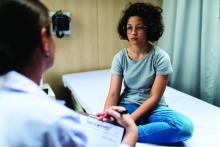TORONTO – Almost half of adolescents (45%) reported that their primary care providers (PCPs) do not routinely ask them about sex, and only 13% report they’ve been offered screening for sexually transmitted infections (STIs), according to a survey study presented at the Pediatric Academic Societies meeting.
And it appears the teenagers aren’t even listening to much of what their parents are saying on the subject: The survey also found that 90% of parents reported that they talk to their adolescents about sex, but only 39% of adolescents reported the same.
“Teens and young adults account for more STIs than all other ages combined,” senior author Kari Schneider, MD, said in a press release, which makes PCP participation on the subject important. Dr. Schneider and the study’s other authors all hail from the University of Minnesota, Minneapolis.Regarding the discrepancy between the parents’ and adolescents’ responses, “Our best guess is that parents may have mentioned sex with their adolescents at some point, but the conversation was not meaningful enough to register on the adolescents’ radars! That type of discussion is probably best had more than once and in more than one way,”she said in an interview.
The adolescents, aged 13-17 years, and parents of adolescents attending the 2017 Minnesota State Fair were invited to complete an 18-question anonymous survey. The teens were queried whether they had seen a PCP in the last year and asked about their discussions about sexual activity and STIs with their physicians and parents. Parents were asked about their knowledge of discussions the teens had with their PCPs and their own discussions with their children. A total of 582 adolescents and 516 parents completed the survey.
Older adolescents were significantly more likely to be queried about sex by their PCPs than younger adolescents – and to be offered STI testing. Females reported more often being asked about sex than males, and whites were less likely than other ethnicities to be offered screening.One-quarter of parents who completed the survey felt that PCPs should not discuss sex with their teens.



